The Global Citizen: a podcast by Katoikos.world
Welcome to the Earth! The Global Citizen is an interview-based podcast exploring the world’s perspectives on world politics, activism, global governance, art, resistance, and the future of our species. With this show, we aim to shine the spotlight on the people engaged with some of the most fascinating goings-on in our human world, from UN officials to former politicians, from grassroots activists to social justice advocates. We believe that big change comes one small step at a time, so we actively try to provide a platform for the most underrepresented voices of the global community that are bravely taking these steps, in spite of the odds. Published by FOGGS (the Foundation for Global Governance and Sustainability) and the online journal Katoikos.world.
Episodes
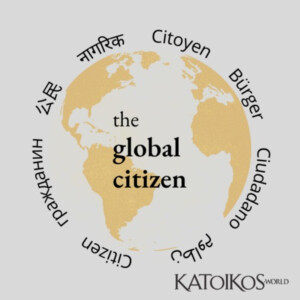
Wednesday Feb 15, 2023
Wednesday Feb 15, 2023
🤝 Since the beginning of our species, the one key factor that has allowed us to survive and thrive is the ability to communicate. With advanced communication comes advanced cooperation - enabling us to achieve feats much greater than any single human would be able to pull off alone. This critical skill has helped us with everything from surviving in prehistoric jungles, to repairing the ozone layer - and it is now more important than ever.
💼 Today, our ability to communicate and cooperate is being put to the ultimate test, as we’re facing arguably the biggest challenge we’ve had to deal with so far: catastrophic climate change. Surviving this cataclysmic event requires effective teamwork. To figure out a collective solution, the international community has created the UNFCCC - the flagship UN agency for dealing with climate change. In the Conference of the Parties (COP) of the UNFCCC, the nations of the world confer with each other and make cooperative pledges to reduce emissions and transition to a sustainable future. But is that enough?
🗣️ My guest for today is Richard Kinley, a retired senior official of the UNFCCC with more than 25 years of experience. He kindly joined me on the show to give me an insider view of this quintessential global forum. We talked about his experience in the UNFCCC and the COPs, the biggest challenges he and his colleagues faced during their active years, and how multilateralism itself has evolved since the beginning of the COPs in the mid 90s. We also discussed whether the international community is doing enough to address climate change, the unfortunate lack of political will in national politics, and outlooks for the future of climate diplomacy.
🎙️ I’m super happy to share this episode, I had so much fun recording it! As a climate nerd and political scientist, this was right up my alley so I hope it’s as engaging and interesting to you as it was to me.
Thank you for tuning in!
Supported and published by:
📰 katoikos.world 📰
🏛️ FOGGS 🏛️

Sunday Jan 15, 2023
Sunday Jan 15, 2023
Part 1 here!
🔥Hatred, suspicion and prejudice is easier to spread than love, compassion and understanding. Fear is a strong driver for human beings and, in times of uncertainty and turmoil (such as our own), it takes hold of us. In the digital age, expressions of hatred and fear can interact with each other, connecting and forming ideological networks based on these root emotions. A prime example of this is the rise of the alt-right (alternative right), an online (initially) far-right, white nationalist movement, originating in the US.
🗣️ Today's guest is Ipsita Chatterjee, a human geographer interested in the economic, cultural and geopolitical impacts of globalization. Ipsita is also a prolific author, and her latest book "The Alt-Right Movement: Dissecting Racism, Patriarchy and Anti-immigrant Xenophobia" served as the basis of our discussion. To help me better understand this phenomenon, she took me through how the alt-right came to be, its rise, and its ideological basis. We also talked about the role of the internet as a driver of alt-right ideology, but also as a potential remedy against it. Overall a super interesting discussion that I really feel gave me a much better understanding of the subject, as well as new perspectives on it. Please enjoy part 2!
Supported and published by:
📰 katoikos.world 📰
🏛️ FOGGS 🏛️
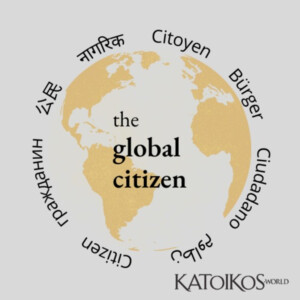
Thursday Dec 15, 2022
Thursday Dec 15, 2022
🌍 The world is in one of the most critical periods that it's ever been in. Tensions are rising, conflicts are higher and deadlier by the year and the pandemic's scars are visible and painful. The war in Ukraine has dimmed the spirit of international cooperation in a time when it is most needed. Things are looking pretty gloomy - so where do we go from here?
🗣️ To help me cope with my existential dread (and also provide incredible value to you, our listeners), Kerstin Leitner joined me on the podcast. Kerstin has 30 years of experience as a UN official, and she has lived in numerous places around the world, like Africa, China and the United States. Today she lives in Berlin and teaches at Potsdam University.
📖 In our talk, we went over a series of topics. We covered major areas of international politics, like the situations of China-Taiwan and Ukraine-Russia, as well as developing countries and their role in the international stage. We also discussed the potential of the UN to be a key actor in the development of global geopolitics in the coming decades, especially given the monumental importance of climate change and the need for serious cooperation in order to tackle it. We also talked about feminist foreign policy as an alternative to the paradigms that currently exist in governance systems worldwide.
Thank you for tuning in!
Supported and published by:
📰 katoikos.world 📰
🏛️ FOGGS 🏛️
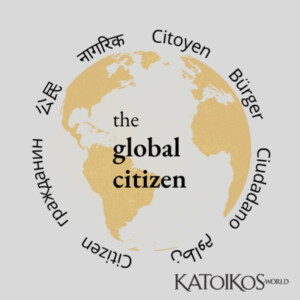
Tuesday Nov 15, 2022
Tuesday Nov 15, 2022
🔥Hatred, suspicion and prejudice is easier to spread than love, compassion and understanding. Fear is a strong driver for human beings and, in times of uncertainty and turmoil (such as our own), it takes hold of us. In the digital age, expressions of hatred and fear can interact with each other, connecting and forming ideological networks based on these root emotions. A prime example of this is the rise of the alt-right (alternative right), an online (initially) far-right, white nationalist movement, originating in the US.
🗣️ Today's guest is Ipsita Chatterjee, a human geographer interested in the economic, cultural and geopolitical impacts of globalization. Ipsita is also a prolific author, and her latest book "The Alt-Right Movement: Dissecting Racism, Patriarchy and Anti-immigrant Xenophobia" served as the basis of our discussion. To help me better understand this phenomenon, she took me through how the alt-right came to be, its rise, and its ideological basis. We also talked about the role of the internet as a driver of alt-right ideology, but also as a potential remedy against it. Overall a super interesting discussion that I really feel gave me a much better understanding of the subject, as well as new perspectives on it.
🎙️Our conversation was actually so interesting that we ended up talking for quite a while, so I split this recording up into 2 episodes. Please enjoy part 1 and stay tuned for part 2!
Supported and published by:
📰 katoikos.world 📰
🏛️ FOGGS 🏛️
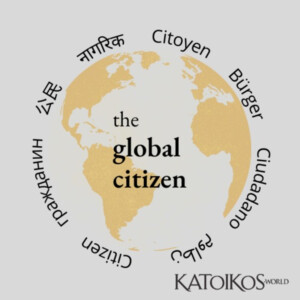
Saturday Oct 15, 2022
Saturday Oct 15, 2022
🌍 Climate change is a global crisis that knows no borders. In consequence of that, climate activism is (thankfully) becoming a global storm that transcends borders, in order to collectively imagine and create a livable, sustainable future for our species, no matter which part of the world we're from. Today, I had the privilege of learning about climate activism specifically in the Middle East and North Africa region by one of the most important players in that space: Neeshad Shafi!
🗣️ Neeshad is an environmentalist, speaker and social change advocate from Qatar. He has over 5 years of experience in analyzing Global Environmental Politics and Climate Policies with a special focus on the Middle East. He's an active member of several global environmental youth groups and contributed actively in international summits, notably the Conference of the Parties of the UNFCCC, the UN Youth Climate Summit, and more. He is also the co-founder of the Arab Youth Climate Movement Qatar, which is the first, registered, Independent, youth led, grassroots, non-profit association in the State of Qatar.
🌳 In our conversation today, we went over the youth climate movement in the MENA region, namely how it functions, what its prospects are and what its future (and the future of global youth climate activism) might look like. Additionally, we explored topics around climate policy in the MENA region in general, touching on various subjects, from oil geopolitics to climate justice. Tune in for more!
Supported and published by:
📰 katoikos.world 📰
🏛️ FOGGS 🏛️
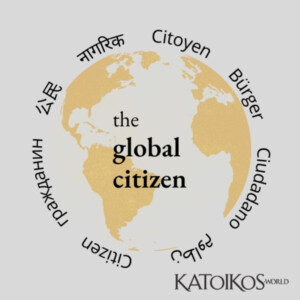
Monday Sep 05, 2022
Monday Sep 05, 2022
Policy is not (or better, should not be) a one-way process; effective policymaking requires feedback and adjustment, so that the ground reality actually corresponds to the policymakers' intentions. Unfortunately, the more layered and complex a governance system is, the harder it gets to make sure that policy is being implemented correctly and addresses the issues it set out to fulfill. This leads to laws not achieving their purpose, and problematic situations remaining as they are, even after being "mended" by legal means. Often, grassroots organizations and NGOs are implicitly tasked with picking up the slack, as governmental measures fall short of the task.
On this episode of the Global Citizen podcast I had the pleasure of interviewing Srishti Sharma, serial entrepreneur and social activist from India. Srishti has been extremely active not only in the world of business, but also in social activism through start-ups and non-profit organizations that aim to tackle problems ranging from protecting women and compromised workers, to getting children back into school.
Our conversation revolved around her own experience in setting up and running these social projects, as well as what role the government plays in supporting (or obstructing!) the work of such initiatives. I was super happy to have her on, and I felt like I left the conversation much more knowledgeable about the interplay between grassroots organizations and the government, especially in the multi-layered and complex environment of India. Tune in to hear all about it!
Supported and published by:
📰 katoikos.world 📰
🏛️ FOGGS 🏛️
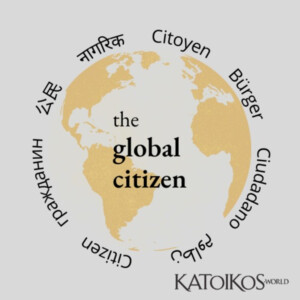
Wednesday Aug 10, 2022
Wednesday Aug 10, 2022
Today’s show is about one of my favorite topics around politics, one that fascinated me ever since I was a student of political science. That topic is federalism, more specifically world federalism, the idea of uniting the entire world under a federal system of governance.
My guest for the day was Eston McKeague, the president of the Young World Federalists and a member of the Board of Citizens for Global Solutions. Eston is a passionate world federalist and advocates for a youth-led movement to unite the world. We had a great conversation around his organization, the Young World Federalists, how that initiative came to be and what it’s all about, and some of its notable work. We also covered federalism in general, examining its history, its current state and how it might work as a globalized system, which is the ideological basis of the world federalist movement. Many thanks to Eston and the YWF!
Links:
2022 Week for World Parliament
Global Challenges: 75 Years After Montreux - Register here
Supported and published by:
📰 katoikos.world 📰
🏛️ FOGGS 🏛️
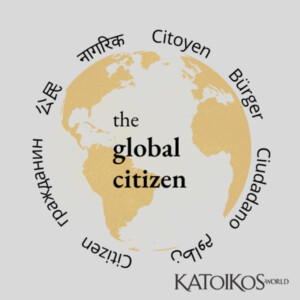
Sunday Jul 03, 2022
Sunday Jul 03, 2022
Policymaking is the art of rules. Handled correctly, it can be an incredible tool that has allowed us to organize ourselves in cells of millions (sometimes billions!) of people, as it orchestrates the rules of the game, ensuring a society with well oiled gears and robust functions. However, if mismanaged, policy can be a major driver of exploitation, inequity and injustice.
🏘️ Today, Sudha Reddy was kind enough to join me on the podcast to talk all about policy from the unique perspective of India, which serves as a great example of how extreme centralization and top-down solutions can lead to misguided decisions from policymakers. Our conversation revolved around the relationship between the local level, the grassroots level, and the top levels of governance, from local and regional governments to international bodies like the UN. India's power structure is deeply characterized by these bottom-up and top-down dynamics, as it is a massive country in terms of population with many different levels of government, from the local and regional governments up to the centralized power that resides with the government in New Delhi.
⚖️ So: how does one create effective and equitable policy within this context? Are all groups treated equally in the policymaking process, or is there preferential treatment? How could we ensure that the people actively take part in making the decisions that affect them?
👩🏾 Sudha was kind enough to join me on the podcast to help me shed some light on these questions. She is Founder and Director of the Eco Foundation for Sustainable Alternatives (EFSA) based in Bangalore, India, focusing on the holistic empowerment and sustainable development of the underprivileged and marginalized rural, urban and indigenous communities, with an emphasis on women, children and youth at the grassroots through direct intervention. Sudha has more than 25 years of experience in social action and the development sector in India and worldwide, academic researching and teaching on capacity building and organizational development, advocacy and campaigning. Sudha is passionately striving for sustainable alternative models of governance, gender, environmental and social justice, eco-spirituality, human and nature interconnectedness, rights and responsibilities and nonviolent approach to peace and harmony.
Thanks for tuning in!
P.S. our connection was not the best it's ever been, so we apologize if the audio quality is not optimal.
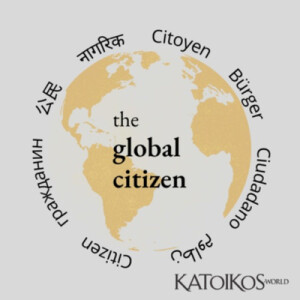
Sunday Jun 19, 2022
Sunday Jun 19, 2022
Today, I had the pleasure of exploring one of the most ancient ways we’ve bonded with each other since the beginnings of our species: stories.
🗣️ The function of storytelling for humans has been quintessential, especially for our transition from life as hunter gatherers to the new social environment of civilization. The stories we tell ourselves and the others around us shape the reality we live in, and ultimately work as the catalyst for our mutual understanding of the world. Stories show what’s real, what isn’t real, and where we fit in all of it.
⭐ In virtually all folklore, one can find stories shared by cultural communities over hundreds of years. These tales serve as a unifying force in the culture, keeping it coherent by offering a common explanation for the world and whatever happens in it. In time, as cultures merge and interact, stories are blended together into narratives that inhabit our collective mind. Especially with the hyperconnectivity of the internet, this process has accelerated massively. What’s for sure is that even in a globalized, post-national world, stories will continue to have the same function, but on a larger scale.
🧔🏻♂️ My guest for today was Jamie Oliviero, a storyteller from Canada. Jamie started telling stories early in his life and has been doing so for more than 45 years. His love of storytelling has led him to many places around the world, from Africa to Australia, in search of indigenous stories that contain fundamental lessons about the human experience. In our conversation, he was kind enough to share some of them, sharing their origins and offering beautiful insights into each of them. We also talked about the pacifying power of stories, how they promote and nurture understanding and compassion, and how the digital age is shaped by the power of sharing them with each other.
Thank you for tuning in, and I hope you enjoy!
Supported and published by:
📰 katoikos.world 📰
🏛️ FOGGS 🏛️
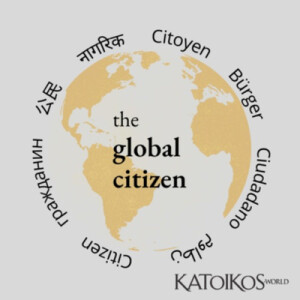
Thursday Jun 09, 2022
Thursday Jun 09, 2022
Sri Lanka is going through one of its worst crises since its independence. Years of ineffective governance under the Rajapaksa family have led to the country defaulting on its external debt, leaving the economy in shambles and sparking massive protests. Inflation is at record highs, prices have hiked, there's been power cuts, a lack of medicine, and other hardships.
Rizvina de Alwis joined me on the podcast to give us an inside view of the situation. Rizvina is a writer, a storyteller, and an advocate, and she’s worked with the UN in areas like gender equality, gender based violence, and more.
We talked about the recent history of Sri Lanka, how things got to the point they are now, what the political and economic factors were that led to the current situation, and what potential ways out of this crisis might exist. Tune in for the full interview!
Supported and published by:
📰 katoikos.world 📰
🏛️ FOGGS 🏛️
